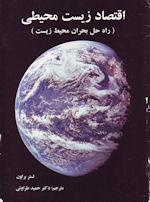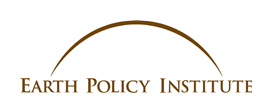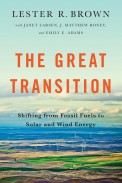Wednesday, January 04, 2012
As noted in our previous blogs, we rely on a network of publishers to translate and publish our publications, thus helping us to reach a global audience. Hamid Taravati, who translates and arranges for our books to be published in Iran, sent us an email recently updating us on some of the environmental work going on there. He is also a member of our Board. The following are excerpts from his letter.
 |
A few weeks ago I received a call from Jahad Daneshgahi, a semi-governmental organization that is the publisher of Plan B and other Lester books and is very close to Iran reformists, asking me when the translation of the World on the Edge would be finished. That was the third time they had called to ask this. I apologized for the delay and promised to deliver the edited text soon. This seldom happens in Iran, a country where the rate of book reading is terribly low. Normally it is writers and translators, especially for scientific books, who ask the publishers, many times, and insist a lot to convince them to publish their books. But for Lester books it is different. At the end, the caller said, "People want to know what will happen next." Around two weeks ago Farzaneh and I were invited to a meeting in which three distinguished agronomists and university professors were present. They had selected us to be honorary members of the board of a new organization established to issue licenses for bio farmers. [The first such organization in Iran.] At dinner, Professor Koochaki, one of the most prominent agronomy professors of Iran and author of many academic books, asked me about Plan B goals and said that your books—Lester's books—have been the most impressive books he had ever read in the environment field because they are so "comprehensive." A few months ago I was invited to a conference to talk about environmental ethics. I quoted Mones Sperber, the German psychologist and philosopher, who says “When a society is confronted with a crisis—environmental, social or political, like confronting a despotic government—the best way to get out of it is not to focus on misery, devastation, crime, etc.—bad news—but to show how we can get out of that, to create hope. Then people will move." People want to know what will happen to their life. They need to have a complete picture of what is happening, good or bad, and to know in what direction they should go. This is what Lester provides, and they absorb it with much enthusiasm. There are many scientists whose books are taught at Iran universities, but those who have read Lester's books have a prejudice to that. I am glad that Lester has started writing his autobiography and I think it will have an important effect on environmentalists. As the Board has discussed last year: "Lester has been one of the very first to promote sustainable development and making it popular." People who have impressed the human community in their real life are the best candidates to write an autobiography. And I am glad that the book will be published by the EPI. I eagerly expect to receive it and start translating immediately. We live in a part of the globe where nothing comes to one's mind except bad thoughts! I think that in the coming year the world will be expecting horrific events—environmental and social. I hope they will not destroy everything we have. One of the most important is the food crisis. The price of food is increasing so rapidly in this country that is worrisome. The price of a loaf of bread which used to be 45 Tooman is now 450 Tooman, ten times more. Also Iran is producing 1 million cars a year. It takes 12 to 14 hours to go from Tehran, the capital, to Chalus on the Caspian Sea, by car on holidays and the distance is only 150 Km [about 93 miles]. The reason is that there are too many cars. Finally I want to thank Lester, and all of you, for the great work that you are doing. We normally post an email each week to all the Iranian NGO's and to our fans and friends, containing an article from EPI or part of the Plan B's books. This is the only thing that can now be done here since nobody reads the existing newspapers. What I receive in response is very encouraging, supportive and comforting. I hope EPI will become more popular day by day and Lester, as one of the most influential thinkers of the world, will guide us to the new routes of breaking the vicious circle of population growth, poverty and environmental degradation. All the best, Hamid |
Hamid and others like him are our inspiration. Through their personal sacrifices, they are making a difference. It is largely because of the work of Hamid and Farzaneh that environmental issues are front and center in Iran. They have provided the information.
So, to all who are similarly working, thank you!
Sincerely,
Reah Janise Kauffman
Page 1 of 1 pages


